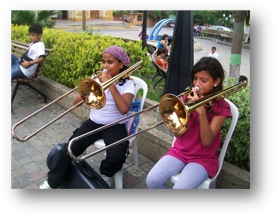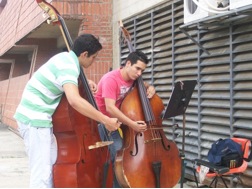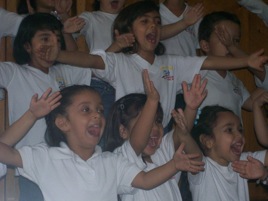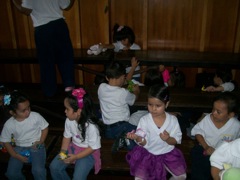Guest Blogger: Marie Montilla NEC Abreu Fellow '11
[On June 2, NEC celebrated the graduation of our second class of Abreu Fellows, the training program we undertook as the result of Maestro José Antonio Abreu’s TED “Wish to Change the World.” The Fellows now go out into the field to lead or support El Sistema-inspired music education programs throughout the United States. These programs, familiarly known as nucleos, are already having a transformative effect on the children they serve. And we anticipate that they will also have a revitalizing effect on the musical scene in the United States, anchoring the lives of professional musicians to the communities in which they work.
Each of the 10 Abreu Fellows recorded their thoughts and experiences throughout the year-long program in a blog. Marie Racine Montilla took to this recording project with particular zest. A violinist from Haiti who is married to a Venezuelan musician brought up in El Sistema, Marie had already taught for several years in Venezuela before coming to NEC. So she brought the perspective of her personal experiences as well as her ebullient personality to her year as a Fellow. She will go on to lead a new nucleo in Pittsfield, MA. I asked Marie to write about her most memorable experiences on the Fellows’ recent five-week residency in Venezuela. –Tony Woodcock]

I traveled to Venezuela recently with NEC’s Abreu Fellows to spend five weeks immersed in El Sistema with the purpose of experiencing and learning as much as possible in the hopes of recreating this magical music education program in the US. The first five days of my trip were spent in Caracas, getting to know the organization, meeting some of its leaders and hearing Gustavo Dudamel’s world famous Símon Bolívar Youth Orchestra of Venezuela in addition to some of the country’s other noteworthy orchestras. The next three weeks were spent traveling through the states of Guarico, Merida, and Lara where I got a chance to visit dozens of nucleos which serve as community music schools. My tour of El Sistema ended with one last week in Caracas before flying back to Boston to celebrate my graduation from the Abreu Fellows Program at New England Conservatory. I would like to share with you some thoughts I have on having witnessed what Simon Rattle calls the “most important thing happening in the world in classical music”.
I must tell you that this trip was not my first encounter with El Sistema. Before coming to NEC I spent three years living in Venezuela and working in a nucleo teaching and conducting. Before that sojourn, I had my own perceptions of El Sistema. I had watched the video Tocar y Luchar and heard a little about it from Venezuelan musicians I met while studying at Indiana University. Classical music has been taught in the same way all over the world for decades, how different could it be in Venezuela? When I finally went there and started teaching and observing I realized that their approach to classical music is in fact very different. In Venezuela, children as young as 5 sit in orchestra with their instruments from day one even if they cannot read their parts. Sectionals and group lessons take priority over private lessons. What is happening in Venezuela is truly remarkable, but it wasn’t until I came to NEC that I fully understood and realized El Sistema’s global influence and all its implications for the future of music education. Venezuela has been called the land of orchestras and El Sistema has been referred to as the fountain of youth for classical music. Based on my experience in Venezuela, I have to agree with both of these claims.
El Sistema is constantly growing. It serves over 300,000 children and the goal is to reach 1 million. New nucleos are being launched each year. Nucleos are much like music schools. This is where students come to play in orchestra, sing in choir, and take part in sectionals and learn theory. But more than a school it is a community center. Students and their families are treated like family by nucleo staff and music teachers.
I visited a nucleo in Santa Rosa, a small town community where over 400 children are enrolled in orchestra and choir. They don’t have a state-of- the art building, and the space they do have is not big enough to serve their enrollment, so they use the city’s main square for lessons and group instruction. On a typical warm sunny afternoon mid-week, children receive lessons outdoors because it’s either that or no lesson at all. Completely dedicated, these children are so excited to play their instruments that they don’t mind the heat, or the constant distractions of passers-by. This was such an inspiring nucleo to visit, I wish I could have stayed longer but with only five weeks to travel and see as much as possible I was soon off to another city, this time in the state of Guarico.

In Guarico I visited the city of San Juan de los Morros and it was no surprise to find that the nucleo had outgrown its space just as in Santa Rosa. Here I also found classes being held outside in a back lot filled with gravel and I even taught several violin students there under light rain.  They use every inch of space available to them to make music, even the secretary’s office is converted into a rehearsal room for the woodwinds pictured here.
They use every inch of space available to them to make music, even the secretary’s office is converted into a rehearsal room for the woodwinds pictured here.
Outdoor lessons and classes are very common in Venezuela because of lack of space. El Sistema has a policy that prohibits turning away any student who wants to participate in a music program. While this could be a logistical nightmare for a lot of institutions, in Venezuela it is just a bump in the road. They do everything they can to find space and instruments for all children who approach a nucleo with the interest to join. I also witnessed this phenomenon in Barquisimeto which is where one of the largest nucleos in Venezuela is located. In Barquisimeto the nucleo operates in the conservatory building and serves over 3000 students weekly. It was a common site to see students practicing outside.
 I spent 8 days in Barquisimeto observing activities and interviewing teachers. In every classroom or rehearsal room I walked into the children were eager to show off their skills. They love to perform for visitors and never seem to mind the intrusion. Every teacher I met was open to sharing their experiences and eager to answer questions. Yahaira, who oversees the very young musicians in the preparatory level in Barquisimeto allowed me to observe all her beginner orchestra rehearsals. Her students range from age 5 to 12 and they start orchestra in her class.
I spent 8 days in Barquisimeto observing activities and interviewing teachers. In every classroom or rehearsal room I walked into the children were eager to show off their skills. They love to perform for visitors and never seem to mind the intrusion. Every teacher I met was open to sharing their experiences and eager to answer questions. Yahaira, who oversees the very young musicians in the preparatory level in Barquisimeto allowed me to observe all her beginner orchestra rehearsals. Her students range from age 5 to 12 and they start orchestra in her class.  I asked her what it’s like on the first day when 5 and 6 year olds come in to sit in orchestra without ever having played their instruments. She smiled and said “Total chaos”. She went on to explain that in El Sistema children learn together, as a community, and the orchestra is that community. And so from day one, they all start learning together and their teachers are very patient and ready to help. Most young orchestra rehearsals have several teachers present sometimes sitting within the ensemble. Every moment is a teaching opportunity. I especially was struck by the bass teacher in the room that day. One of the little bass players was so small that he could not hold the instrument and play it at the same time, so the bass teacher held the bass for him as he bowed open strings during rehearsal. If you notice the bass teacher pictured here is also the bassist practicing outdoors in the previous picture. He is one of the members of the nucleo’s youth orchestra and is himself a student of the school. El Sistema is known for empowering youth and one of the ways this is done is by giving young accomplished musicians opportunities to teach and serve as role models. These young teachers are called ‘monitors’ and get paid for their time. This is one of the many ways El Sistema teaches kids responsibility.
I asked her what it’s like on the first day when 5 and 6 year olds come in to sit in orchestra without ever having played their instruments. She smiled and said “Total chaos”. She went on to explain that in El Sistema children learn together, as a community, and the orchestra is that community. And so from day one, they all start learning together and their teachers are very patient and ready to help. Most young orchestra rehearsals have several teachers present sometimes sitting within the ensemble. Every moment is a teaching opportunity. I especially was struck by the bass teacher in the room that day. One of the little bass players was so small that he could not hold the instrument and play it at the same time, so the bass teacher held the bass for him as he bowed open strings during rehearsal. If you notice the bass teacher pictured here is also the bassist practicing outdoors in the previous picture. He is one of the members of the nucleo’s youth orchestra and is himself a student of the school. El Sistema is known for empowering youth and one of the ways this is done is by giving young accomplished musicians opportunities to teach and serve as role models. These young teachers are called ‘monitors’ and get paid for their time. This is one of the many ways El Sistema teaches kids responsibility.
The majority of the students I met in Barquisimeto were beginners and had only been playing their instruments since October. I want to share with you a short video of Isaias Gonzalez who is 9 years old and a member of the children’s orchestra in Barquisimeto. He has only been playing the flute for eight months.

 Although El Sistema is an orchestral program, large ensemble playing is not its only focus. Many nucleos offer “kinder” music and baby choir for very young children. Music theory is taught at all nucleos although some use non-conventional approaches. All children enrolled in a nucleo sing in the choir at some point. In Barquisimeto I observed the “Baby Coro” class which was outstanding. This is a group of preschoolers who meet twice a week to sing and play together.
Although El Sistema is an orchestral program, large ensemble playing is not its only focus. Many nucleos offer “kinder” music and baby choir for very young children. Music theory is taught at all nucleos although some use non-conventional approaches. All children enrolled in a nucleo sing in the choir at some point. In Barquisimeto I observed the “Baby Coro” class which was outstanding. This is a group of preschoolers who meet twice a week to sing and play together.  The class lasts one hour of which 45 minutes is spent working on breathing exercises, vocal warm-ups, and body posture. The children practice their songs and at the 45-minute mark the choir director pulls out a large bag filled with stuffed animals and toys which the children play with until it’s time to be picked up by mom and dad.
The class lasts one hour of which 45 minutes is spent working on breathing exercises, vocal warm-ups, and body posture. The children practice their songs and at the 45-minute mark the choir director pulls out a large bag filled with stuffed animals and toys which the children play with until it’s time to be picked up by mom and dad.
Children start singing at a very young age and they continue to sing for many more years. While still at the nucleo in Barquisimeto one afternoon I heard beautiful voices coming from the front lawn of the conservatory and when I looked outside it was a youth choir rehearsing under a tree. I’d like to share a short video of their rehearsal with you.

The social implications of having so many young people enrolled in these activities are great–particularly in small communities like Santa Rosa where 400 children are enrolled at the nucleo. The children’s orchestra in Santa Rosa rehearses in a large open room with views to the city plaza. The sound of music-making can be heard from blocks away. There is no air conditioning and on the particular afternoon we visited temperatures were well above 80 degrees. Here is the orchestra rehearsing.

These children are champions in their communities. Everybody knows who they are, and they represent what is best from their neighborhoods and barrios. In Venezuela music education has become a universal right and the image of the orchestra is now a part of their national identity. I would like to mention here an experience David Gracia (also an Abreu Fellow at NEC) had while trying to locate the nucleo in the very small town of El Sombrero. His visiting group stopped on several occasions to ask for directions, asking many locals where they could find the “music school”. No one knew of the music school. They changed the question to “where can we find the orchestra” and like magic, everyone could point them in the right direction.
 Venezuelans are very proud of their orchestras and I did not meet a single nucleo director who did not have their own children enrolled in their programs. Here is a picture of Leoanardo Hurtados’ daughter Ana. (Notice her beautiful set-up.) Leoanardo is the director of the nucleo in San Juan de los Morros and he himself is a violinist. He dreams of bringing the Latin American Violin Academy to his state of Guarico so he can offer the students at his nucleo even more opportunities.
Venezuelans are very proud of their orchestras and I did not meet a single nucleo director who did not have their own children enrolled in their programs. Here is a picture of Leoanardo Hurtados’ daughter Ana. (Notice her beautiful set-up.) Leoanardo is the director of the nucleo in San Juan de los Morros and he himself is a violinist. He dreams of bringing the Latin American Violin Academy to his state of Guarico so he can offer the students at his nucleo even more opportunities.
I could go on sharing photos and anecdotes from my trip but I want to share with you the main impression I took away with me. This is the devotion of a whole country to classical music. Every single teacher in El Sistema has a blind devotion to the children and youth that reaches beyond adversity. El Sistema represents Venezuela’s hope in its youth and we can learn a lot from them.

Marie Montilla
![]()

No comments yet.
Add your comment